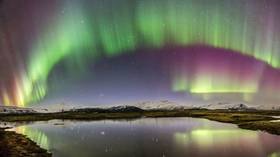'More interested in pipelines than indigenous people': Trudeau faces activists' wrath over yet ANOTHER contentious energy project
With Canada paralyzed by anti-pipeline blockades that shut railways and crippled traffic, Justin Trudeau canceled a Caribbean trip to manage the crisis — but indigenous people opposing the project have little reason to trust him.
When he was first elected five years ago, Trudeau convinced liberal voters that he was an environmentalist and that concern for the natural environment would be a cornerstone of his administration. He gave heartfelt speeches on climate change and cutting carbon emissions. He pledged to phase out federal fossil fuel subsidies. He promised to end the “inaction” of the previous government on environmental protection and leave younger generations with an “even more beautiful, sustainable, and prosperous” country than exists now. He also committed to reconciliation with First Nations people.
Since then, his government declared a “climate emergency” — and he has even marched alongside teen climate activist Greta Thunberg. Yet, Trudeau has also approved new oil and gas pipelines, all but abandoned the promise to end fossil fuel subsidies, ignored indigenous fears over the destruction of their native lands and essentially sold out to corporate interests over environmental protection.
Also on rt.com Trudeau scraps overseas trip after pipeline protesters BLOCK US-Canada bridge amid ongoing rail shutdowns (VIDEO)The recent anti-pipeline blockades and demonstrations have sprung up in support of Wet’suwet’en hereditary chiefs who are fighting against the construction of the 670-kilometre Coastal GasLink — a liquefied natural gas (LNG) pipeline in British Columbia that would cross-cut First Nations territory.
When the Royal Canadian Mounted Police (RCMP) began enforcing an injunction preventing interference with the construction of the $6.6 billion fracked-gas pipeline, supporters of the Wet’suwet’en chiefs shut down the Canada National (CN) rail network in the eastern part of the country and blocked traffic on highways, at bridges and ports in multiple locations.
“Indigenous people in Canada have never been able to believe any politicians and so I’m not surprised...it doesn’t surprise me at all that [Trudeau] is more interested in the pipeline going through than indigenous rights,” Jennifer Wickham, a member of the Gitdumden clan told RT.
While local Band Councils have given their approval for the project, the Wet’suwet’en hereditary chiefs — who deal more directly with protecting native territories and claim authority over rights and land titles — are “unanimous” in favor of banning “all pipelines from our traditional territory,” Wickham said.
The chiefs have taken several different legal actions against the pipeline, which will carry fracked gas through critical and “pristine” indigenous headwaters, but none have been successful — despite the fact that First Nations rights are protected under the Canadian constitution.
We can drink directly out of the river, it’s so pure. There’s not many places in the world like that anymore.
Protesters are also concerned that the company will use a pipe big enough to carry bitumen — heavier oil which can be diluted with LNG to be transported more easily through pipelines. Coastal GasLink has said it will not convert the pipeline for bitumen "without the consent" of First Nations people, indicating that this conversion is likely planned for some point in the future.
“The LNG is bad enough and bitumen is even worse — and we don’t want either of those to be going through or underneath our river because we know from experience all around the world that pipes leak, they break,” Wickham said, explaining that the terrain on the pipeline route is mountainous, dangerous and “would almost guarantee that there would be a break in the pipe.”
Proposed alternative (and more expensive) routes for the pipeline would have taken it nearer to more populated residential areas, where naturally, people don’t want a pipeline running through their backyard. “So they chose instead to put it through our backyard with our salmon spawning river and our pristine drinking water,” Wickham said.
Also on rt.com ‘Climate emergency’ on Monday, pipeline expansion on Tuesday: Trudeau the fraud strikes againOne of the biggest problems for indigenous peoples is that they “don’t have the resources to go to court to show that they have title over particular pieces of land,” Gordon Christie, director of the Indigenous Legal Studies Program at the University of British Columbia told RT.
“The Wet’suwet’en could probably show that they have title over the land that’s in dispute, but it would take them years in court and millions of dollars to do so,” he said. By the time they had finished, the pipeline would have been long-done. Ultimately, Christie said, First Nations people are still waiting for Trudeau’s talk to turn into action.
Indigenous people have been waiting for that for a century. This isn’t the first government that’s promised all kinds of things and then nothing changes.
With his jaunt to the Caribbean on hold (he was traveling to seek support on Canada’s bid for a seat on the United Nations Security Council), Trudeau held emergency meetings with his cabinet. On Tuesday, he said he wants a quick and peaceful solution to the crisis, but didn’t offer ideas on how that might come about.
Meanwhile, Conservative Party leader and pro-pipeline Andrew Scheer called on police to end the blockades, and accused “anti-energy activists” of holding the Canadian economy hostage. Trudeau shot back to say that Canada is not a country “where politicians get to tell the police what to do in operational matters.” Is that as far as he is willing to go?
If the myth of Trudeau as a staunch environmentalist wasn’t shattered when he green-lighted the Trans Mountain pipeline expansion (one day after declaring “climate emergency”) or when he received a standing ovation at an oil industry shindig in 2017, it surely will be now. As the pipeline crisis continues, the PM is also fielding criticism from within his own party over the approval of an oilsands mine in Alberta — seen as yet another turn away from his pro-environment pledges.
Ultimately, environmentalists and indigenous people see only one solution: If Justin Trudeau actually wants to maintain a relationship with the First Nations, Wickham said, then he will “call the RCMP out of our territory and put an end to the pipeline.” If that doesn’t happen, “there will be no reparation of our relationship.”
Trudeau has been in power since 2015. If he was going to emerge as a sincere defender of the environment and trustworthy advocate of First Nations' rights, it probably would have happened by now.
Like this story? Share it with a friend!
The statements, views and opinions expressed in this column are solely those of the author and do not necessarily represent those of RT.















